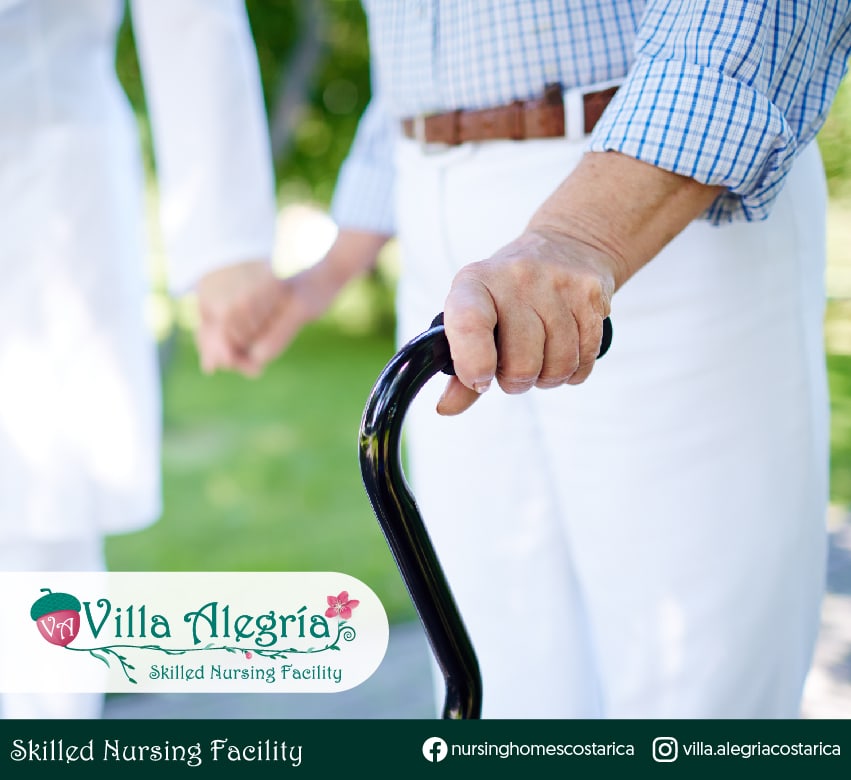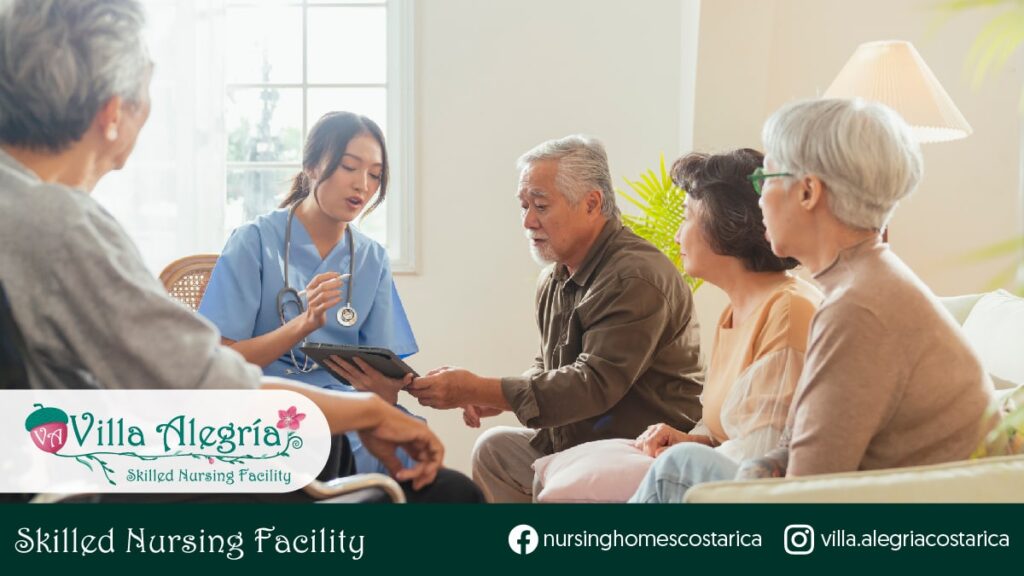
Types of Residences for the Elderly
Types of Residences for Seniors: discover with us the types of residences that Costa Rica offers and their Importance in Society
Types of Residences for the Elderly:
Introduction
Population aging is a global phenomenon that has led to a significant increase in demand for specialized care and services for older adults. Many seniors are looking for alternatives to living independently in their homes and turn to nursing homes as a viable and safe option. These residences offer an environment carefully designed to meet the specific needs of each individual, providing a variety of services adapted to the different stages of aging. In this article, we will explore the different types of senior residences that exist, the services they offer, and their importance in today’s society.
I. Types of Residences for Seniors
1. Independent Residences:
Independent residences are a popular option for seniors who are still active, independent, and do not require constant assistance. These facilities offer private housing units, such as apartments or houses, that allow residents to maintain their autonomy and lifestyle. Independence does not mean isolation; On the contrary, these residences promote social interaction between residents through community and social activities. They often provide services such as cleaning, maintenance, and 24-hour security, giving residents and their families peace of mind.

2. Assisted Residences:
Assisted living facilities are designed for older adults who need some level of assistance with daily activities, such as bathing, dressing, medication management, or mobility. Healthcare professionals and trained staff provide personalized support to help residents maintain their independence as much as possible. In addition to basic care, these residences offer recreational and social programs to promote emotional well-being and active participation of residents in the community. You can find these types of services at Villa Alegría, If you are interested, do not hesitate to contact us.

3. Specialized Care Residences:
This type of residence focuses on providing specialized care to older adults with more complex medical needs or specific conditions, such as dementia, chronic illnesses, or rehabilitation after surgery. The highly trained staff is responsible for providing medical and therapeutic care adapted to each individual, promoting recovery and well-being. These residences have facilities and services that guarantee a safe and comfortable environment, providing peace of mind to both residents and their families.
At Villa Alegría we are fully aware of how complex and challenging it can be for families to face these situations. We understand that caring for a loved one in delicate medical conditions requires dedication, patience and constant support. For this reason, we are committed and happy to provide you with our services and assistance in these difficult times. Our highly trained and committed team is here to offer a warm and safe environment, where each resident receives personalized and compassionate care. We value the trust families place in us and work tirelessly to ensure their loved ones receive the most specialized and loving care possible.

4. Residences for the Elderly with Memory Programs:
Designed specifically for people with memory-related conditions, such as Alzheimer’s or dementia, these residences focus on providing a safe and structured environment. Specialized staff address the unique needs of residents, stimulating their cognitive abilities and encouraging social interaction. Memory programs in these residences are essential to improving the quality of life and autonomy of residents as they face the challenges of memory loss.

5. Luxury Residences for the Elderly:
Luxury residences for seniors offer a premium experience to those seeking a high level of comfort and exclusive services. In addition to basic amenities, these residences can provide luxury amenities such as well-equipped gyms, spas, private chefs, tours, and top-notch entertainment. They are designed to provide a luxurious and enjoyable retirement experience for those who can afford it.

6. Intergenerational Residences:
This type of residence is an emerging trend that seeks to promote interaction between older adults and younger people. They share the same space and often share activities and experiences, which benefits both generations. Older adults find social and emotional stimulation, while younger adults gain wisdom and perspective from their elders. This intergenerational interaction strengthens community ties and helps break down the barriers and stereotypes associated with aging.

II. Personalized Services in Residences for Seniors

The importance of nursing homes lies in their ability to provide personalized services that adapt to the individual needs of each person. Services offered vary depending on the type of residence, but some of the most common include:
1. Medical Care and Health Services:
In nursing homes, it is common to have medical and nursing staff who can provide basic medical care and monitor residents’ health. For those in skilled nursing homes, more complex medical services and specialized therapies are provided to treat specific conditions.
2. Assistance with Daily Activities:
In assisted living facilities and those with memory programs, staff are trained to help residents with daily activities, such as bathing, dressing, preparing meals, and administering medications. This assistance allows older adults to maintain their independence and dignity, while ensuring that they are well cared for.
3. Recreational and Social Activities:
Senior residences offer a wide variety of recreational and social activities to encourage interaction between residents and improve their emotional well-being. These activities may include exercises, classes, cultural events, outings, and other opportunities to participate in the community.
4. Servicios de Nutrición:
Una dieta equilibrada es esencial para el bienestar de los adultos mayores. Las residencias se esfuerzan por ofrecer comidas nutritivas y adaptadas a las necesidades de los residentes, considerando restricciones dietéticas y preferencias individuales.
5. Cleaning and maintenance services:
In independent and assisted living facilities, cleaning and maintenance services are common to ensure a clean and safe environment for residents.
6. Transport services:
Some residences offer transportation services to help residents attend medical appointments, recreational activities, or shop.
III. The Importance of Residences for the Elderly in Society
1. Care and Wellbeing of the Elderly:
Nursing homes play a crucial role in the care and well-being of older people. They provide a safe, supervised and carefully designed environment to address the physical, emotional and social needs of residents. In addition, they offer access to specialized medical and therapeutic services that help maintain and improve the quality of life of older adults.
2. Relief for Families and Caregivers:
Aging a loved one can be an emotionally and physically challenging experience for families and caregivers. Senior residences offer a place where older adults can receive the care and attention they need, freeing families and caregivers from the burden of providing full-time care. This allows them to focus on maintaining meaningful relationships with their loved ones and enjoying quality moments together without the pressure of constant caregiving.
3. Promotion of Socialization and Community:
Social isolation is a common concern among older adults living at home. Senior residences provide a community environment where residents can interact with people their age, participate in social activities, and share common interests. This encourages socialization and building meaningful relationships, which can have a positive impact on residents’ mental and emotional health.
4. Contribution to the Economy and Job Creation:
Senior residences are an important part of the local economy and contribute to economic growth by creating jobs in various sectors, such as healthcare, hospitality and recreational services. Additionally, these facilities generate demand for goods and services, which benefits local businesses.
5. Research and Advances in Geriatric Care:
Nursing homes also contribute to research and the development of best practices in geriatric care. Through observing and monitoring the health and well-being of residents, valuable data can be obtained to improve care protocols and enrich the understanding of aging and its challenges.
Conclusions
In summary, senior living facilities play an essential role in today’s society by providing a safe and carefully designed environment to address the specific needs of each individual. They offer a wide variety of options, from independent residences for active seniors to skilled care residences for those with more complex medical needs. The importance of these residences lies in their ability to provide personalized and adapted services, improve the quality of life of older adults, provide relief to families and caregivers, and promote socialization and emotional well-being. Additionally, they contribute to economic growth and job creation, and play a role in research and advancement of geriatric care. Ultimately, senior living facilities are a vital part of a society that values and respects its senior citizens, providing them with the care and support necessary for a full and enriching life.
And last but not least, medical tourism in Costa Rica is a great experience for those foreigners who seek high-quality medical interventions and, at the same time, want to enjoy the natural beauty and cultural diversity that this country has to offer. . Costa Rica has become a prominent destination for medical tourism due to its excellent medical infrastructure, highly trained doctors, and cutting-edge technology in the field of medicine. International patients can feel safe and confident receiving specialized treatments in a world-class environment. Additionally, the opportunity to explore Costa Rica’s natural wonders, such as its beaches, rainforests and wildlife, allows visitors to combine their pursuit of wellness with an unforgettable tourism experience. Medical tourism in Costa Rica not only offers top-notch medical care, but also the possibility of enriching the soul and spirit by immersing yourself in the cultural and natural wealth of this beautiful country, but we will delve into this topic in a future article.

Fuentes de referencia: https://pro.internationalliving.com/p/ILRETINDEXEVRG23/WILVZ503/?h=true